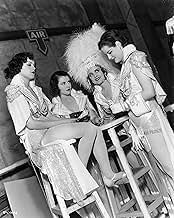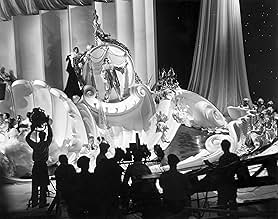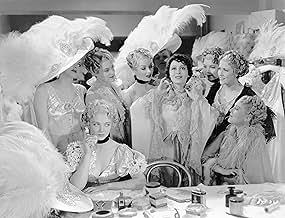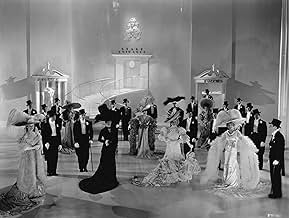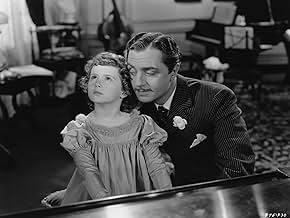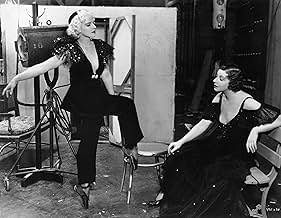CALIFICACIÓN DE IMDb
6.6/10
9.5 k
TU CALIFICACIÓN
Las desventuras de Florenz Ziegfeld Jr., conocido productor del espectáculo.Las desventuras de Florenz Ziegfeld Jr., conocido productor del espectáculo.Las desventuras de Florenz Ziegfeld Jr., conocido productor del espectáculo.
- Ganó 3 premios Óscar
- 8 premios ganados y 5 nominaciones en total
Fanny Brice
- Fannie Brice
- (as Fannie Brice)
Joseph Cawthorn
- Dr. Ziegfeld
- (as Joseph Cawthorne)
- Dirección
- Guionista
- Todo el elenco y el equipo
- Producción, taquilla y más en IMDbPro
Opiniones destacadas
It's hard to think of today, what with the theatre being a highbrow and typically minimalist medium, but back in the days before movies became big business, stage productions often presented the public with phenomenal displays of grandeur. In the early years of the twentieth century, Florenz Ziegfeld was a theatrical showman who had Busby Berkely's worship of feminine beauty and Cecil B. DeMille's sense of scale. He was creating Hollywood-style extravagance back when Hollywood was just a patch of scrubland.
Fast-forward to 1936, a couple of years after Ziegfeld's death, and cinema still bears his mark. Musicals (which were still often based around stage performances) were often showcases for a variety of dancing and singing talents, usually building to a spectacular finale. The Great Ziegfeld is more than just a biopic, it is the culmination of this strand in cinema; the first epic musical. Here we see the 30's musical's shimmering sets and full-on dance routines on a scale never before seen on the screen. Robert Z. Leonard directs with his usual sweeping camera moves, often slowly pulling back to reveal the size of the production. But he also lets his camera get deeply involved in the more dramatic scenes.
Apart from the various song-and-dance people involved, the casting here is very much a Hollywood affair. William Powell was then the go-to man for such smart and witty types. He and Myrna Loy were well-known as a screen couple, from The Thin Man pictures amongst others. They both give adequate portrayals, but in truth these two need a smaller, more intimate production to shine in their own right. The performance that best fits the size of The Great Ziegfeld is that of Luise Rainer. Melodramatic, full of presence, she seems always on the verge of breaking down into some farcical display of ham acting, but never quite does so. It's not a realistic performance by any stretch, but it is beautiful in its theatricality.
Ziegfeld's influence would live on in musical cinema for many years after his death. The Great Ziegfeld was just the first in a series of pictures tipping their hat to the producer. Meanwhile, many of the stars made famous by Ziegfeld – Billie Burke, Eddie Cantor, Will Rogers, Ray Bolger – were finding fruitful careers on the silver screen. It was, after all, the way of the future. You see, it wasn't just the depression that finished Ziegfeld. Even if he had lived, cinema would have provided him with too much competition to continue with his follies, especially with the advent of sound. But this is beside the point. If The Great Ziegfeld shows anything, it is that the spirit of showmanship that he championed could live on, if not in one medium then in another.
Fast-forward to 1936, a couple of years after Ziegfeld's death, and cinema still bears his mark. Musicals (which were still often based around stage performances) were often showcases for a variety of dancing and singing talents, usually building to a spectacular finale. The Great Ziegfeld is more than just a biopic, it is the culmination of this strand in cinema; the first epic musical. Here we see the 30's musical's shimmering sets and full-on dance routines on a scale never before seen on the screen. Robert Z. Leonard directs with his usual sweeping camera moves, often slowly pulling back to reveal the size of the production. But he also lets his camera get deeply involved in the more dramatic scenes.
Apart from the various song-and-dance people involved, the casting here is very much a Hollywood affair. William Powell was then the go-to man for such smart and witty types. He and Myrna Loy were well-known as a screen couple, from The Thin Man pictures amongst others. They both give adequate portrayals, but in truth these two need a smaller, more intimate production to shine in their own right. The performance that best fits the size of The Great Ziegfeld is that of Luise Rainer. Melodramatic, full of presence, she seems always on the verge of breaking down into some farcical display of ham acting, but never quite does so. It's not a realistic performance by any stretch, but it is beautiful in its theatricality.
Ziegfeld's influence would live on in musical cinema for many years after his death. The Great Ziegfeld was just the first in a series of pictures tipping their hat to the producer. Meanwhile, many of the stars made famous by Ziegfeld – Billie Burke, Eddie Cantor, Will Rogers, Ray Bolger – were finding fruitful careers on the silver screen. It was, after all, the way of the future. You see, it wasn't just the depression that finished Ziegfeld. Even if he had lived, cinema would have provided him with too much competition to continue with his follies, especially with the advent of sound. But this is beside the point. If The Great Ziegfeld shows anything, it is that the spirit of showmanship that he championed could live on, if not in one medium then in another.
MGM's epic biopic of theatrical producer Florenz Ziegfeld, starring William Powell in the title role. As with most Hollywood biopics, liberties are taken with the facts. Since this was made in the Golden Age of Hollywood, the intention is to portray Mr. Ziegfeld in the best possible light. If it were made today, the opposite would be true and all his faults would be emphasized (probably to the point of slander). I'll leave it to you to decide which is the better approach. Anyway, the movie covers Ziegfeld's rise as a Barnum-esque showman to becoming one of Broadway's most successful producers with his Ziegfeld Follies show. Along the way he attracts many women and marries two of them (Luise Rainer, Myrna Loy).
It's a spectacle made in the grand Old Hollywood fashion, heavy on melodrama and lavish musical numbers. Powell is fine in the lead. I have no idea how closely he "gets" Ziegfeld here, as he seems very much like William Powell's usual screen persona to me. He would reprise his role as Ziegfeld a decade later in 1946's Ziegfeld Follies (also from MGM). Luise Rainer is terrific in her Oscar-winning role as Ziegfeld's first wife, Anna. Myrna Loy is a little miscast as Billie Burke but it's hard to argue against any opportunity to see Powell and Loy on screen together. The rest of the cast includes solid supporting players Frank Morgan, Virginia Bruce, Ray Bolger, Reginald Owen, and Nat Pendleton. A. A. Trimble does a spot-on impersonation of Will Rogers.
It is a bit overlong. The first half could have done with some trimming. Still, a fine cast keeps things interesting and those musical numbers are dynamite. Dennis Morgan's "A Pretty Girl is Like a Melody" number is one of the highlights. The film was nominated for seven Academy Awards with three wins, including Best Picture and Best Actress for Rainer. Its award wins are the subject of debate for some today, who argue it is one of the least-deserving Best Picture winners. That's kind of laughable when you think about it, as the Best Picture Oscar rarely goes to the most deserving film. That was true then and is even more true today, in my opinion. It's definitely something you'll want to try out if you are a fan of classic Hollywood and all its glitz and glamour. They don't make 'em like this anymore.
It's a spectacle made in the grand Old Hollywood fashion, heavy on melodrama and lavish musical numbers. Powell is fine in the lead. I have no idea how closely he "gets" Ziegfeld here, as he seems very much like William Powell's usual screen persona to me. He would reprise his role as Ziegfeld a decade later in 1946's Ziegfeld Follies (also from MGM). Luise Rainer is terrific in her Oscar-winning role as Ziegfeld's first wife, Anna. Myrna Loy is a little miscast as Billie Burke but it's hard to argue against any opportunity to see Powell and Loy on screen together. The rest of the cast includes solid supporting players Frank Morgan, Virginia Bruce, Ray Bolger, Reginald Owen, and Nat Pendleton. A. A. Trimble does a spot-on impersonation of Will Rogers.
It is a bit overlong. The first half could have done with some trimming. Still, a fine cast keeps things interesting and those musical numbers are dynamite. Dennis Morgan's "A Pretty Girl is Like a Melody" number is one of the highlights. The film was nominated for seven Academy Awards with three wins, including Best Picture and Best Actress for Rainer. Its award wins are the subject of debate for some today, who argue it is one of the least-deserving Best Picture winners. That's kind of laughable when you think about it, as the Best Picture Oscar rarely goes to the most deserving film. That was true then and is even more true today, in my opinion. It's definitely something you'll want to try out if you are a fan of classic Hollywood and all its glitz and glamour. They don't make 'em like this anymore.
This movie is worthwhile viewing for any fan of classic cinema or William Powell, but over 73 years later it's hard to see why this film won Best Picture of 1936 and a film like "Dodsworth" lost. Today it does seem overly long on musical numbers that could have been cut and short on storyline. There are probably several reasons that the picture could have been better and wasn't, the primary reason being that at the time the film was made Ziegfeld had only been dead four years and was thus still fondly and recently remembered. Also, according to the little featurette that comes with the DVD, Ziegfeld's widow Billie Burke was heavily involved in the making of the film and wouldn't allow anything in it to besmirch his memory. Finally, the production code had just begun to be sternly enforced in 1934, making a true accounting of Ziegfeld's personal life pretty much impossible. As a result Ziegfeld is portrayed as just the unluckiest of fellows who is always being wrongly perceived as a ladies' man just because his business involves large numbers of chorines.
In fact, Ziegfeld cheated on both wives incessantly, and Ziegfeld never even formally married Anna Held to begin with - instead they had a common law marriage according to the statutes of New York. However, none of these other factors can account for the complete lack of chemistry between Powell (Ziegfeld) and Loy (as Billie Burke) in the film. Considering how the two had already been in several movies together by the time this film was made, and that they never failed to sparkle on screen together in the other movies, there must have been either a complete lack of direction or over-direction to wind up with the rather wooden performance that results whenever the two are in scenes together.
This movie would probably rate only about 6/10 if it wasn't for William Powell's performance. Marvelous as always, he was at least allowed to portray Ziegfeld as the cagey trickster and gambler with tremendous class that he was, and he absolutely makes the film. I can't think of any other actor of that time period who could have done as good a job.
In fact, Ziegfeld cheated on both wives incessantly, and Ziegfeld never even formally married Anna Held to begin with - instead they had a common law marriage according to the statutes of New York. However, none of these other factors can account for the complete lack of chemistry between Powell (Ziegfeld) and Loy (as Billie Burke) in the film. Considering how the two had already been in several movies together by the time this film was made, and that they never failed to sparkle on screen together in the other movies, there must have been either a complete lack of direction or over-direction to wind up with the rather wooden performance that results whenever the two are in scenes together.
This movie would probably rate only about 6/10 if it wasn't for William Powell's performance. Marvelous as always, he was at least allowed to portray Ziegfeld as the cagey trickster and gambler with tremendous class that he was, and he absolutely makes the film. I can't think of any other actor of that time period who could have done as good a job.
William Powell stars as Florenz Ziegfeld in his "biography" of the great Broadway producer. This is a lush and long film filled with great scenes and a few that are too long. Clocking in at about 3 hours, THE GREAT ZIEGFELD is one of MGM's biggest attempts at creating a blockbuster musical, and it won the Oscar for best film.
Powell is, as always, terrific. Oddly he did not receive an Oscar nomination for this film but did get one the same year for MY MAN GODFREY. Luise Rainer won the best actress Oscar for her performance as Anna Held. Myrna Loy plays Billie Burke. The great Fanny Brice appears as herself and just about steals the show until they stupidly and abruptly cut away from her as she starts singing "My Man." She doesn't show up again.
Ray Bolger gets a whole number to himself. And Dennis Morgan fronts the mammoth "A Pretty Girl Is Like a Melody" number (although it's the voice of Allan Jones), which ranks among the great production numbers of the era. The camera slowly pans up a seemingly endless spiral staircase filled with pretty girls as draperies are raised to expose more and more staircase. Then we finally reach the top with Virginia Bruce posed there. It's a giddy and spectacular sequence.
The ballet sequence featuring Harriet Hoctor is rather a bore. I'd rather have seen more of Fanny Brice. Brice is hilarious in the dressing-room with blonde Esther Muir. Powell and Rainer are really excellent in this film. Notable co-stars include Frank Morgan, Joseph Cawthorn, Herman Bing, Marcelle Corday, Nat Pendleton, Grace Hayle, Ernest Cossart, William Demarest, and Reginald Owen.
And while Brice appears as herself the Will Rogers and Eddie Cantor appearances are fakes. Virginia Bruce plays a character based on Lillian Lorraine, and Rosina Lawrence plays Marilyn Miller (here named Sally Manners).
An excellent film in the old style and worth the 3 hours it takes to watch it. Ziegfeld was a great showman and he deserved this fabulous tribute. He died in 1932, having given the world a number of major stars and great shows.
Powell is, as always, terrific. Oddly he did not receive an Oscar nomination for this film but did get one the same year for MY MAN GODFREY. Luise Rainer won the best actress Oscar for her performance as Anna Held. Myrna Loy plays Billie Burke. The great Fanny Brice appears as herself and just about steals the show until they stupidly and abruptly cut away from her as she starts singing "My Man." She doesn't show up again.
Ray Bolger gets a whole number to himself. And Dennis Morgan fronts the mammoth "A Pretty Girl Is Like a Melody" number (although it's the voice of Allan Jones), which ranks among the great production numbers of the era. The camera slowly pans up a seemingly endless spiral staircase filled with pretty girls as draperies are raised to expose more and more staircase. Then we finally reach the top with Virginia Bruce posed there. It's a giddy and spectacular sequence.
The ballet sequence featuring Harriet Hoctor is rather a bore. I'd rather have seen more of Fanny Brice. Brice is hilarious in the dressing-room with blonde Esther Muir. Powell and Rainer are really excellent in this film. Notable co-stars include Frank Morgan, Joseph Cawthorn, Herman Bing, Marcelle Corday, Nat Pendleton, Grace Hayle, Ernest Cossart, William Demarest, and Reginald Owen.
And while Brice appears as herself the Will Rogers and Eddie Cantor appearances are fakes. Virginia Bruce plays a character based on Lillian Lorraine, and Rosina Lawrence plays Marilyn Miller (here named Sally Manners).
An excellent film in the old style and worth the 3 hours it takes to watch it. Ziegfeld was a great showman and he deserved this fabulous tribute. He died in 1932, having given the world a number of major stars and great shows.
Knowing several people, on and outside of IMDb, who consider The Great Ziegfeld one of the weakest Best Picture winners, that didn't stop me from seeing it anyway. To me though, while it's not flawless and not the best film of the year it was still incredibly well-made and entertaining stuff and from personal view it is nowhere near one of the worst Best Picture winners.
The Great Ziegfeld agreed is overlong with a draggy and at times uneventful first half and half an hour could easily have been trimmed. And more could have done with the relationship between Ziegfeld and Billie Burke which appeared late in the film and didn't feel developed enough, almost like an afterthought.
However, The Great Ziegfeld is very lavishly mounted, with photography that's both beautiful and clever, sumptuous costume design and some of the most handsomely gorgeous sets of any 30s musical. Other pleasures are the marvellous and very well-staged(without being too overblown) songs with A Pretty Girl is Like a Melody being an absolute show-stopper, a script peppered with humour and heart and the mostly poignant story. Standout scenes were Fanny Brice's charming My Man, Ray Bolger's witty dancing to My Follies Girl, Luise Rainer's heart-breaking telephone(justifiably famous) and especially A Pretty Girl is Like a Melody with its clever photography and perhaps one of the best uses of a staircase in a film. The direction is adept and the performances are great, with William Powell suave personified and especially Luise Rainer who is the epitome of charm and grace, capable of a good range of emotions as seen in the telephone scene. Fanny Brice, Frank Morgan, Ray Bolger are all memorable, while Myrna Loy is underused she's hardly wasted either.
Overall, a well-made, entertaining and very good film and well worth the look. 8/10 Bethany Cox
The Great Ziegfeld agreed is overlong with a draggy and at times uneventful first half and half an hour could easily have been trimmed. And more could have done with the relationship between Ziegfeld and Billie Burke which appeared late in the film and didn't feel developed enough, almost like an afterthought.
However, The Great Ziegfeld is very lavishly mounted, with photography that's both beautiful and clever, sumptuous costume design and some of the most handsomely gorgeous sets of any 30s musical. Other pleasures are the marvellous and very well-staged(without being too overblown) songs with A Pretty Girl is Like a Melody being an absolute show-stopper, a script peppered with humour and heart and the mostly poignant story. Standout scenes were Fanny Brice's charming My Man, Ray Bolger's witty dancing to My Follies Girl, Luise Rainer's heart-breaking telephone(justifiably famous) and especially A Pretty Girl is Like a Melody with its clever photography and perhaps one of the best uses of a staircase in a film. The direction is adept and the performances are great, with William Powell suave personified and especially Luise Rainer who is the epitome of charm and grace, capable of a good range of emotions as seen in the telephone scene. Fanny Brice, Frank Morgan, Ray Bolger are all memorable, while Myrna Loy is underused she's hardly wasted either.
Overall, a well-made, entertaining and very good film and well worth the look. 8/10 Bethany Cox
Oscars Best Picture Winners, Ranked
Oscars Best Picture Winners, Ranked
See the complete list of Oscars Best Picture winners, ranked by IMDb ratings.
¿Sabías que…?
- TriviaA.A. Trimble, who portrays Will Rogers in the film, was a Cleveland map salesman who frequently impersonated Rogers at Rotarian lunches.
- ErroresIn the "Rhapsody in Blue" portion of the mammoth "Pretty Girl" number, one of the silver-fringe-and-antlers quartet of dancers gets visibly disoriented when her group does its final moves. She's the second one from the left, and her movements are completely out of sync with the other three until, with a thump, she sits down on the stairs. Since the incredibly complex number was shot in very long takes, the error was allowed to remain in the film.
- Citas
Florenz Ziegfeld Jr.: [after catching Ray Bolger doing a little softshoe backstage] Buddy, you're better with your feet than you are with your broom.
Ray Bolger: Mr. Ziegfeld, you think so? Gee, I wish you'd give me a chance. I've got talent, and I'd like to get away from shifting scenery and moving props.
Florenz Ziegfeld Jr.: How long have you been a property boy?
Ray Bolger: Five years, but my heart hasn't been in it.
Florenz Ziegfeld Jr.: You've been working a long time without your heart, buddy.
- Créditos curiososThe opening credits display the title of the film and the names of the stars in marquee lights, as they would be on Broadway.
- Versiones alternativasThere is an Italian edition of this film, as Bonus Extra, on DVD "FOLLIE DI ZIEGFELD", re-edited with the contribution of film historian Riccardo Cusin. This version is also available for streaming on some platforms.
- ConexionesEdited into Las follies de Ziegfield (1941)
- Bandas sonorasHarriet Hoctor Ballet
(1936) (uncredited)
(also called "A Circus Must Be Different in a Ziegfield Show")
Music by Con Conrad
Lyrics by Herb Magidson
Sung and danced by male and female choruses
Danced by Harriet Hoctor
Selecciones populares
Inicia sesión para calificar y agrega a la lista de videos para obtener recomendaciones personalizadas
- How long is The Great Ziegfeld?Con tecnología de Alexa
Detalles
- Tiempo de ejecución2 horas 56 minutos
- Color
- Relación de aspecto
- 1.37 : 1
Contribuir a esta página
Sugiere una edición o agrega el contenido que falta

Principales brechas de datos
By what name was El gran Ziegfeld (1936) officially released in India in English?
Responda

